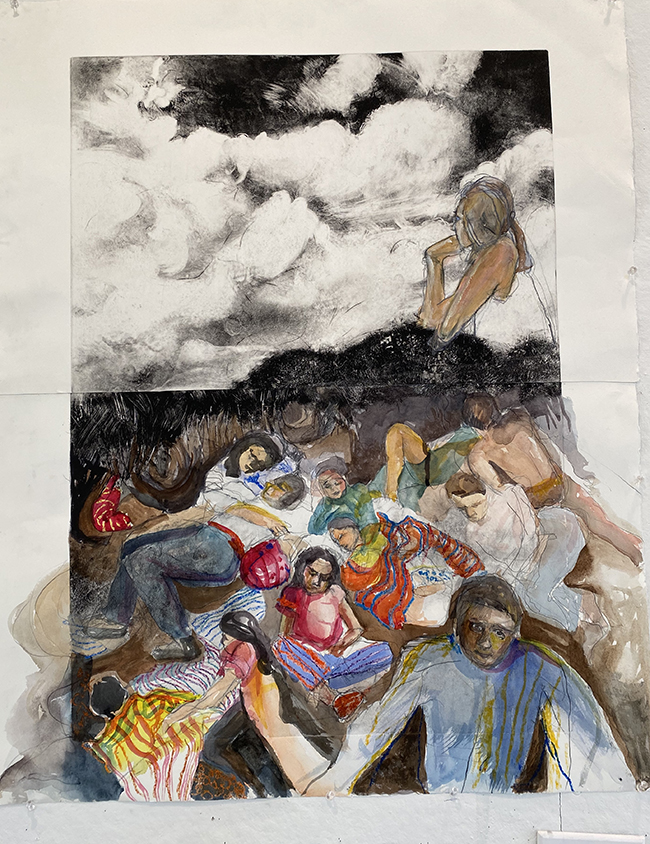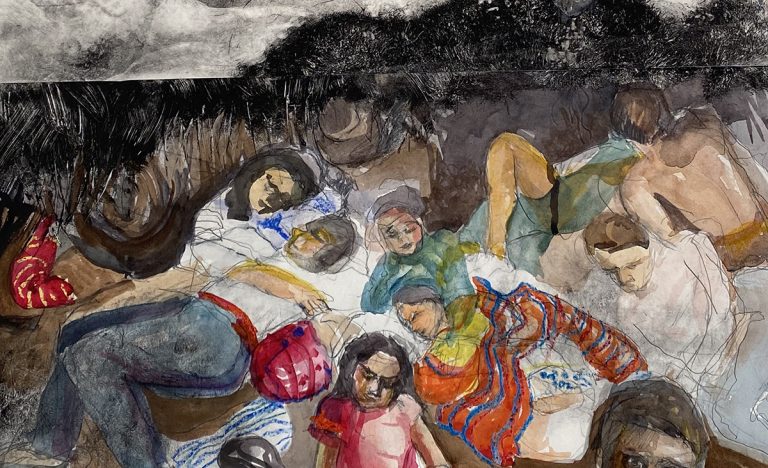Beth Vendryes Williams grew up surrounded by noise, life, and the endless motion of six younger siblings in a bustling home on Long Island’s North Shore. In that swirl of chaos, art became her quiet place. When the house got too loud, she escaped into books, the woods, or her sketchpad. Drawing and painting became more than hobbies — they were ways to slow down and listen to her own voice. Over time, her creative practice deepened. She began to wonder why the urge to create was so persistent. Art, for Beth, turned into a form of reflection. Through it, she searches for peace, beauty, light, and compassion hidden in everyday life. She sees objects not just for what they are, but for what they invite us to notice — where light and hope linger, even when the world feels overwhelming.

Beth Vendryes Williams’s work leans into stillness.
It’s not flashy or loud. It’s built to make you stop. To notice. To think.
One of her pieces, “Unseen Without Recourse,” shows this clearly. She used pastel and solarplate etching on Fabriano cotton paper. It’s a large piece — 44 by 30 inches — and it pulls you in with both delicacy and weight. You can’t rush past it.
Beth’s vision is shaped by her own background. Her family weaves together cultures from Jamaica, the West Indies, France, and Sicily. Growing up with this mix gave her a deep respect for the world’s diversity. But it also made her aware of how easy it can be to overlook other people’s pain. “Sometimes it’s difficult to acknowledge the suffering of the other,” she says. Yet that’s exactly what she asks herself — and others — to try and do.
In “Unseen Without Recourse,” the title itself points to a world where some are invisible, where dignity gets brushed aside. The medium matters too: solarplate etching leaves marks that feel both precise and weathered, almost like memories pressed into the paper. The pastels layer in a softness, a kind of grace. The result is an image that feels both fragile and permanent, like a whispered truth you can’t unhear once you’ve caught it.
Beth talks about understanding that “we are all precious souls, deserving of respect.”
You feel that in the way she handles her materials. Every line, every shadow, feels like a kind of offering.
Not in a heavy, sentimental way — more like a quiet acknowledgment: I see you.
There’s a lot of generosity in her approach. Beth isn’t trying to hammer a message into the viewer. She’s opening a space. She’s inviting you to come closer, to sit with discomfort, and to maybe see something you hadn’t let yourself see before.
Her background — that mix of cultures — doesn’t just add flavor to her art. It shapes the whole way she looks at the world. It reminds her that there are layers to every story, and not every layer is visible at first glance. Her work doesn’t shy away from that complexity. It leans into it.
At the heart of her practice is a belief in connection. Even when the subjects of her pieces speak to pain or distance, there’s always a thread reaching out.
Hope is not a guarantee in Beth’s work. It’s a choice. A practice.
“Unseen Without Recourse” feels especially relevant today. In a world where it’s easy to tune out, easy to harden yourself against news and suffering, Beth’s work asks a simple but urgent question:
What would it mean to really see each other?
Not to fix, not to pity — just to witness, to honor, to respect.
Her technique — mixing soft pastels with the harder lines of etching — mirrors that question. It’s not about smooth perfection. It’s about holding two realities at once: fragility and resilience, pain and beauty.
Beth Vendryes Williams makes art that doesn’t demand attention but earns it.
Quietly, steadily, honestly.
And in doing so, she reminds us that beauty isn’t something loud and perfect.
It’s in the overlooked corners, the hidden struggles, the simple act of trying to see.

